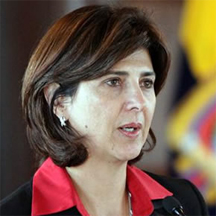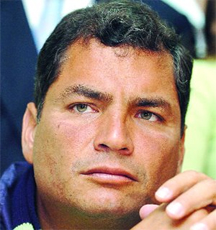Bogota, Colombia— The US State Department wasn’t terribly smart when it rejected a demand by Latin American populist leaders that Cuba be invited to an April 14 summit of President Barack Obama with 33 hemispheric leaders in Colombia. It should have accepted the petition, and used it to grill Cuba’s military dictatorship in front of a world audience.
The diplomatic ruckus started at a meeting of leftist presidents in Venezuela earlier this month, when Ecuadorean President Rafael Correa proposed that members of the Venezuelan-led ALBA bloc boycott the 5th Summit of the Americas to be held in Cartagena, Colombia, unless Cuba — the only country in the hemisphere excluded from the meeting — was allowed to participate. Venezuela and other countries immediately approved the motion.

Colombia — the host country, which is trying to avoid defections that would mar the summit — sent Foreign Minister Maria Angela Holguin to Havana to try to solve the problem, but she came back empty-handed. She told reporters after the visit that Cuba indeed wants to attend the summit.

The diplomatic impasse is making big headlines in the region. During a visit here, almost everybody I talked to referred to the issue. Not surprisingly, the prevailing narrative in the Colombian press is that the United States is once again punishing a small and proud Caribbean island for its independent foreign policy — the old David vs Goliath tale, which Cuba has played so often over the years.
So what should Washington do? Instead of rejecting Cuba’s presence, the State Department should have put out a statement saying that Cuban ruler Gen Raúl Castro is more than welcome to attend the summit as an outside guest to answer several questions, starting with for how long Cuba plans to remain the last military dictatorship in the Western Hemisphere.

More specifically, and given diplomats’ penchant for legal formalities, Gen Castro should be asked:
Why is Cuba not complying with former President Fidel Castro Ruiz’s commitment at the 1996 Sixth Ibero-American Summit in Viña del Mar, Chile, to respect “political pluralism,” “human rights,” and “political freedoms?” At that summit, Castro signed the Vina del Mar Declaration, which specifically calls for “the freedoms of expression, association and assembly.”
Needless to say, Cuba still has hundreds of political prisoners — two of whom have recently died from hunger strikes — and allows no opposition parties.
Why is Cuba still violating Article 13 of the United Nations Declaration of Human Rights, which states that “Everyone has the right to leave any country, including his own, and to return to his country”? To this day, Cubans need a government permit to be able to leave the island.
Prominent Cuban blogger Yoani Sanchez, who was denied a permit to visit Brazil earlier this month, wrote in her Twitter account Feb. 3 that “It’s the 19th time that they violate my right to enter and leave my country… I am a prisoner.”
If Gen Castro responds, as he surely would, that the US “empire” and its allies are attacking his island because it has become a model society, Obama’s answer should be very simple: “If the Cuban people were so happy, and love you so much, why don’t you allow free elections?”
My Opinion: The ALBA threat to boycott the Summit of the Americas over Cuba’s attendance is pure political theatre. Venezuelan President Hugo Chávez and his Ecuadoran apprentice, President Rafael Correa, won’t miss the summit: They are demagogues who need to make constant headlines, and who won’t miss a chance to do that at a mega-summit with Obama.
Most likely, they are creating this fuss to place themselves at centre-stage at the summit. Rather than staying out, they will probably settle for a vague statement in the summit’s final declaration that they can interpret as an invitation for Cuba to the next summit.
Obama — who, by the way, has just given a red carpet welcome to China’s likely future president Xi Jinping, a leader of another dictatorship — should turn the tables and invite Cuba to the summit provided that Gen Castro is willing to answer some uncomfortable questions. Cuba won’t accept, and the United States will look much better than it does now.
© The Miami Herald, 2012. Distributed by Knight Ridder/Tribune Media Services.





